Vitamin A is fat soluble vitamin that means it can be stored inside your body. You don’t need to eat it daily as vitamins which are fat soluble are not needed to eat on daily basis. It is stored in your liver and whenever your body needs it, it will be released from liver.
Vitamin A performs various functions inside your body. It is best known for its role in the eye health. It also has function in the immunity responses produced by your body. You also need it for the proper growth of bones, tissues and reproductive system.
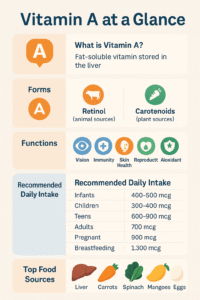
Function of Vitamin A
Vitamin A is important vitamin for the functioning of your body. It has active role in following.
Vision and Vitamin A
The most important function that is performed by this vitamin is its role in the maintenance of good vision and eye health. It is a component of protein known as rhodopsin. This protein is responsible for the absorption of light in retina. Due to this light you become able to watch things around you.
If you don’t have enough supply of vitamin A to eye then your eyes cannot produce moisture which causes blurry vision. If you haven’t sufficient supply of this vitamin it may causes night blindness because retina cannot perform its function properly. In severe cases its deficiency causes complete blindness as well.
Immune System Support
Vitamin A has a role in making you strong by boosting immune system. It is vital for the maintenance of your mucosal barriers in the skin. These are your first line of defense against the pathogens.
It supports your immune system by promoting the production of white blood cells particularly T-cells and macrophages.
These white blood cells are the army of immune system. When production and function of white blood cells is enhanced by Vitamin A, their ability to fight against infections and pathogens also increases.
Skin and Cell Growth
Vitamin A helps the tissues to maintain the function of tissue’s surface. In these tissues surfaces skin, respiratory track and urinary track are included.
It also supports your wounds to heal and make your skin youthful by promoting regeneration of cell and tissues.
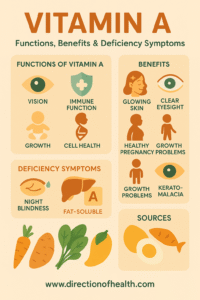
Reproductive Health and Vitamin A
This particular vitamin have very prominent role in the health of reproductive systems of both male and female.
In male it is responsible for the production of sperms. It has active role in the maturation of male reproductive system. It also helps the reproductive system for the maturation of sperms and then their transportation.
In female it is responsible for the egg maturation by helping the egg follicles. It is also involved in hormones productions, which are responsible for the implantation of fertilized egg.
It is also important for the healthy pregnancy as it is required for the development of fetus during pregnancy.
Bone Health
Most of times we associate Vitamin D with the bone health but we forgets the role of vitamin A for the proper growth and development of bone. A balance intake of vitamin A makes it sure that bones are growing stronger and their structure is well maintained.
Antioxidant Properties
It also has some oxidative properties especially beta carotene, a ptovitamin A. it helps your body in protection against the oxidative stress caused by free radicles.
It reduces the risk for you to have diseases like heart problems and cancers due to its oxidative properties.
Importance of Vitamin A
Vitamin A performs various functions for the integrity of body. Due to its wide range of functioning that it performed inside your body it is crucial for your health and development.
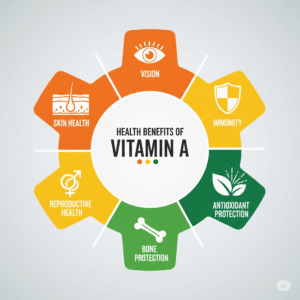
- It prevents night blindness; a disease in which you have difficulty in seeing when light is low.
- If you don’t have sufficient supply of this vitamin then it makes you more vulnerable against the attack of germs especially in children where it can cause severe illness like measles and diarrhea.
- Due its role in the skin maintenance its deficiency can cause skin issues like acne and psoriasis.
Daily Intake of Vitamin A
The Recommended Dietary Allowance (RDA) aacording to NIH for Vitamin A varies depending on your age, sex, and life stage. Below are the general guidelines for daily intake:
|
Age |
Daily Intake |
|
Infants (0-6 months) |
400 mcg |
|
Infants (7-12 months) |
500mcg |
|
Children ( 1-3 Years) |
300mcg |
|
Children (4-8 Years) |
400 mcg |
|
Children (9-18 years) |
600 mcg |
|
Adults (14-18 years) |
Male: 900mcg Female:700 mcg |
|
Adults 18+ |
Male: 900mcg Female: 700 mcg |
|
Pregnant women |
770 mcg |
|
Breastfeeding women |
1300 mcg |
This is general recommendation to prevent the deficiency in your body and proper functioning. This vitamin is fat soluble so it might be stored in your body more than it is needed. In such cases it can lead to toxicity. So it is best for you to take within the recommended limits for your body health.
Food Sources of Vitamin A
This vitamin exists in two forms.
- Preformed vitamin A also known as retinol
- Provitamin A also known as carotenoids like beta carotene
Preformed is found naturally in animal products while the second form exists in plant sources.
Preformed Vitamin A (Retinol)
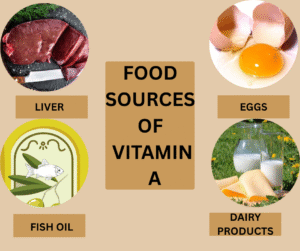
You can find it easily in animal based foods. This is active form of the vitamin and easily used by your body. It is present in following:
- Liver (beef, chicken)
- Fish oil (cod liver oil)
- Eggs
- Dairy products (milk, cheese, butter)
Provitamin A (Carotenoids)
This form is present in plants as pigments and body convert them into vitamin A. most common carotenoid is beta carotene, alpha carotene and beta-cryptoxanthin. It is found in following food items:
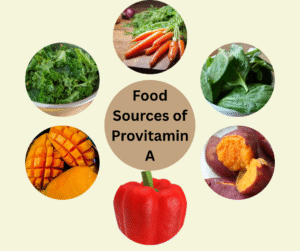
- Carrots
- Sweet potatoes
- Spinach
- Kale
- Butternut squash
- Mangoes
- Red peppers
- Cantaloupe
Medical Conditions and Deficiency Symptoms
When you are not having enough supply of vitamin A it starts to effect the proper functioning of your body. Most common medical conditions raised by its deficiency are as follow:
Night Blindness
One of the common and earliest conditions identified due to deficiency of vitamin A is night blindness. In this condition patient can’t see clearly in low or dim light.
The main cause of night blindness is lower production of rhodopsin protein which is responsible for light absorption. Rhodopsin is produced by vitamin A.

Symptoms
- Difficulty seeing in dim light
- Dryness in eyes
- Reduced vision clarity at night
Dry Eyes
If body is not having enough upply of vitamin A it can lead to dry eyes. The cause of dry eyes is the lower production of tears. Lower level of tears causes dryness and irritation.
Symptoms
- Red, itchy eyes
- Dryness and discomfort
- Sensitivity to light
Xerophthalmia
If deficiency of vitamin A persists for longer period of time and not treated with sufficient supply then it can cause xerophthalmia.
In this medical condition cornea conjunctiva gets dry. Over longer period of time it can cause blindness.
Symptoms
- Dry eyes
- Irritation in eyes
- Sensitivity to light
Skin Issues
This vitamin has prominent role in the outer appearance of skin by maintaining the integrity of epithelial cells. If its deficiency arises in your body it can cause skin issues like dry and rough skin. It also increases the risk of infections.

Symptoms
- Dry, scaly patches
- Delayed wound healing
- Skin infections
Weakened Immunity
It has crucial role in the development of your immunity. When its deficiency arises it lead to weakened immune function. You become more vulnerable to the infections like respiratory, diarrhea and measles. and pathogens.
It has more important role in the development of children. In developing countries one of the causes of higher mortality rate among children is deficiency of vitamin A.
Symptoms
- Frequent colds
- Respiratory infections
- Slow recovery from illness
Impaired Growth and Development in Children
When its deficiency is present in the children it causes growth stunning and delayed physical development. This vitamin regulates cellular growth and differentiation so when children are deprived of it, they suffer from improper development of bones, teeth and tissues.
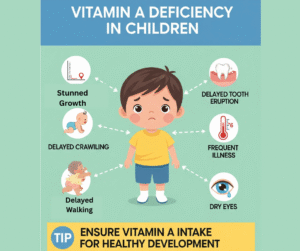
Symptoms:
- Slower than normal height and weight gain
- Tooth eruption is delayed
- Motor skills like crawling and walking are delayed
- Frequent infections
- Poor bone formation and muscular development
Reproductive Issues
This vitamin has active role in the development of reproductive organs. If it is insufficient, it can lead to infertility and complications during pregnancy. It affects both male and female reproductive health. Its deficiency also causes premature birth or birth defects.
Symptoms in Females:
- Difficulty conceiving (infertility)
- Irregular menstrual cycles
- Increased risk of miscarriage
- Complications during pregnancy
- Higher chances of premature birth or birth defects
Symptoms in Males:
- Reduced sperm count or quality
- Infertility
- Decreased libido
In Fetal Development (due to maternal deficiency):
- Impaired organ development
- Birth defects (especially in the eyes, heart, and lungs)
- Low birth weight
Keratomalacia
It is condition which is caused by the severe deficiency of vitamin A. This is a condition in which cornea softens and breaks down which results in complete blindness.
Symptoms:
- Dryness of eyes (xerophthalmia)
- Night blindness (early sign)
- Bitot’s spots (foamy, white patches on the conjunctiva)
- Eye irritation and discomfort
- Clouding and softening of the cornea
- Corneal ulcers or rupture
- Complete blindness if untreated


Very informative…
Very informative..